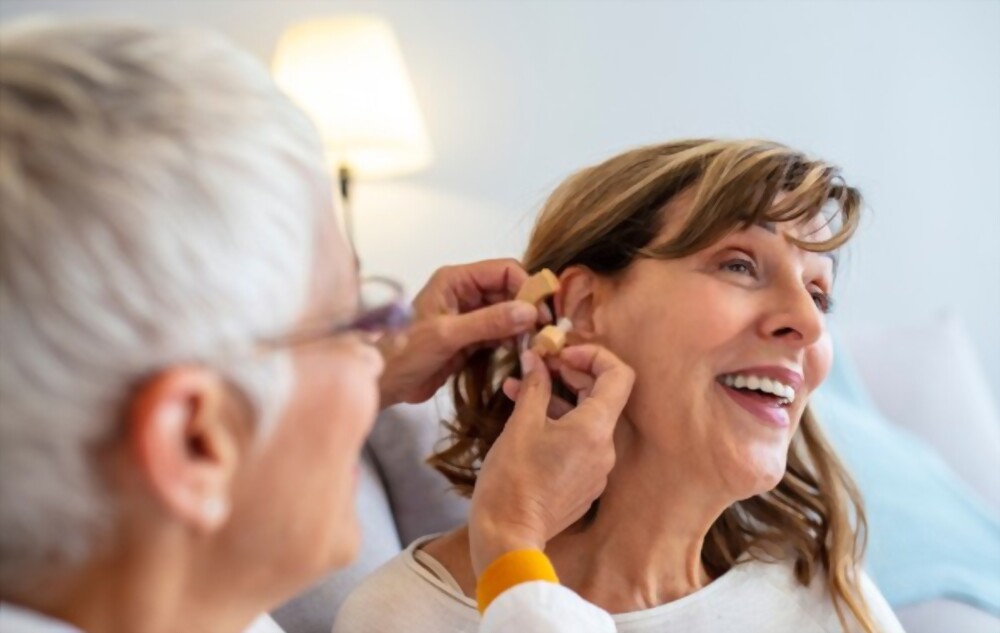Correlation Between Cognitive Decline and Hearing Aids

People who suffer hearing loss are more likely to develop problems with cognition than those who do not have hearing loss. But which comes first, hearing loss or dementia? And how do hearing aids help?
What is Hearing Loss?
There are three main kinds of hearing loss; conductive, sensorineural or mixed. Children with ‘glue ear’ usually make up those with conductive hearing loss, which often resolves independently or may require draining surgery.
Sensorineural hearing loss is usually due to genetic errors that lead to biochemical processes in the cochlea or problems in the ear structure. Mixed hearing loss is a blend of conductive and sensorineural hearing loss, for instance, where aged related deafness and a long-standing eardrum perforation merge. Noise exposure is proving less of a problem now that we have more robust safeguards in our work and social noise environments.
Age-related hearing loss
More than half of Australians aged between 60 and 70 years suffer some form of hearing impediment, which can be debilitating. Hearing loss caused by ‘presbycusis’ or normal ageing is common and usually affects older adults. One indicator of age-linked hearing loss is the inability to hear people talking to you when there is background noise.
The Trouble With Symptoms Developing Slowly
The symptoms of hearing loss may begin gradually, and it can be many years before you notice any loss of hearing function unless you have a hearing test. Treatment can be complex without regular hearing function tests, especially when people wait up to six or seven years before seeking therapy after their initial diagnosis. The importance of early detection and treatment cannot be overemphasised.
The Correlation Between Hearing Loss & Dementia
Hearing health is closely related to healthy brain function, which is why it’s crucial to seek hearing tests, diagnosis and treatment early. According to research, the correlation between cognitive decline and hearing loss has now been established. Professor Frank Lin and colleagues from Johns Hopkins School of Medicine in the US 1) have found hearing loss is a factor that may increase the risk of developing cognitive decline.
The Risk Factors in Hearing Loss and Dementia
Risk factors involved in hearing loss and cognitive decline include some that can be managed through appropriate medical treatment and lifestyle changes.
The risk factors include:
- Lack of adequate physical activity
- Low mental and social stimulation
- Diabetes
- Smoking
- Depression
- Obesity
- Hypertension
- Poor diet
- Excessive consumption of alcohol
- Genetics
Professor Lin’s and other research found those with mild hearing loss symptoms could have double the likelihood of developing dementia as those whose hearing function is normal. But those with acute hearing loss could be five times more likely to experience dementia or 80 per cent cognitive decline.
How Can Hearing Aids Help Prevent Cognitive Decline?
While there is no cure for cognitive decline (leading to dementia), treatments are available for hearing loss, including hearing aids. And since hearing loss is now recognised as a “modifiable risk factor for dementia”(2), wearing hearing aids may be the answer to delaying cognitive decline in older adults.
A New Australian Study Reveals Positive Finds
Chief investigator of a new study into the correlation between cognitive decline and hearing loss, University of Melbourne Associate Professor Julia Sarant, told Science Daily that cognitive function improvement is rare in older adults.
However, the researcher tested about 100 adults aged from 62 to 82 with hearing loss and found the use of hearing aids over 18 months in these volunteers improved speech perception and brain function. The research also found participants reported their quality of life and listening disability had significantly improved.
Other Findings From the Research
The research, published in 2020, found 97.3 per cent of the participants showed either executive function stability or clinically significant improvement in their mental ability to organise information, plan and carry out tasks.
Another finding suggested a more substantial improvement in cognitive function when participants wore hearing aids more frequently. The women in the study were found diligent at wearing hearing aid devices, but men were less engaged.
The university plans further research into the correlation between hearing loss, cognitive decline and how hearing aids can help, using a larger sample, Prof Sarant said.
Why consult Ace Audiology for your hearing test and aids
If you want a hearing test, our professional audiologists can help you at either our state-of-the-art clinics in Bulleen or Ivanhoe. Contact us today for a hearing test or talk about hearing aids and devices to help you live a more satisfying life.
Bulleen: 03 9850 8888, email reception@aceaudiology.com.au
Ivanhoe: 03 9440 9409, email reception@aceaudiology.com.au.
References:
